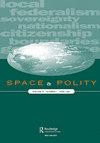穿着加纳边境:通过国家星期五服装计划表演边境
IF 1.1
Q2 GEOGRAPHY
引用次数: 1
摘要
本文认为,吸引公民身份和国家认同的文化和政治策略可以用来调节跨境流动。在这一过程中,可以招收公民团体作为主要代理人。根据“全国星期五着装计划”(加纳政府的一项倡议,旨在鼓励白领在星期五穿上国产纺织品,以减少外国纺织品的消费,从而减少外国纺织品的流入),这篇论文说明,公民的身体既是划定边界的空间,也是代表民族国家行使边界的地缘政治角色。本文章由计算机程序翻译,如有差异,请以英文原文为准。
Wearing the Ghanaian border: performing borders through the National Friday Wear programme
ABSTRACT This paper argues that cultural and political strategies that appeal to citizenship and national identity can be used to regulate flows across borders. In this process, citizen bodies may be enrolled as key agents. Drawing on the National Friday Wear programme – a Ghanaian government initiative intended to encourage white-collar workers to dress their bodies in domestically produced textiles on Fridays to reduce the consumption, and thereby also the inflow, of foreign textiles – the paper illustrates that citizen bodies are both spaces upon which borders are inscribed and geopolitical actors that perform borders on behalf of the nation-state.
求助全文
通过发布文献求助,成功后即可免费获取论文全文。
去求助
来源期刊

SPACE AND POLITY
GEOGRAPHY-
CiteScore
4.10
自引率
4.20%
发文量
19
期刊介绍:
Space & Polity is a fully refereed scholarly international journal devoted to the theoretical and empirical understanding of the changing relationships between the state, and regional and local forms of governance. The journal provides a forum aimed particularly at bringing together social scientists currently working in a variety of disciplines, including geography, political science, sociology, economics, anthropology and development studies and who have a common interest in the relationships between space, place and politics in less developed as well as the advanced economies.
 求助内容:
求助内容: 应助结果提醒方式:
应助结果提醒方式:


